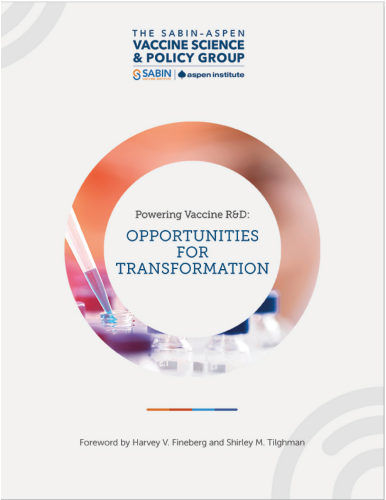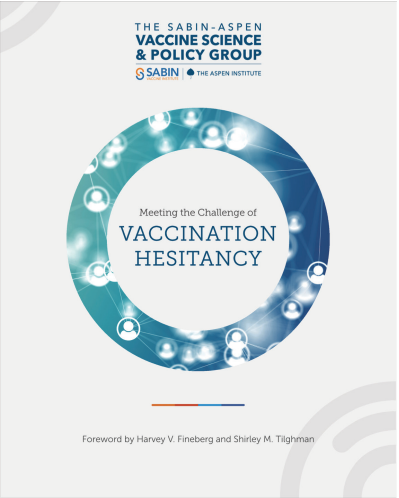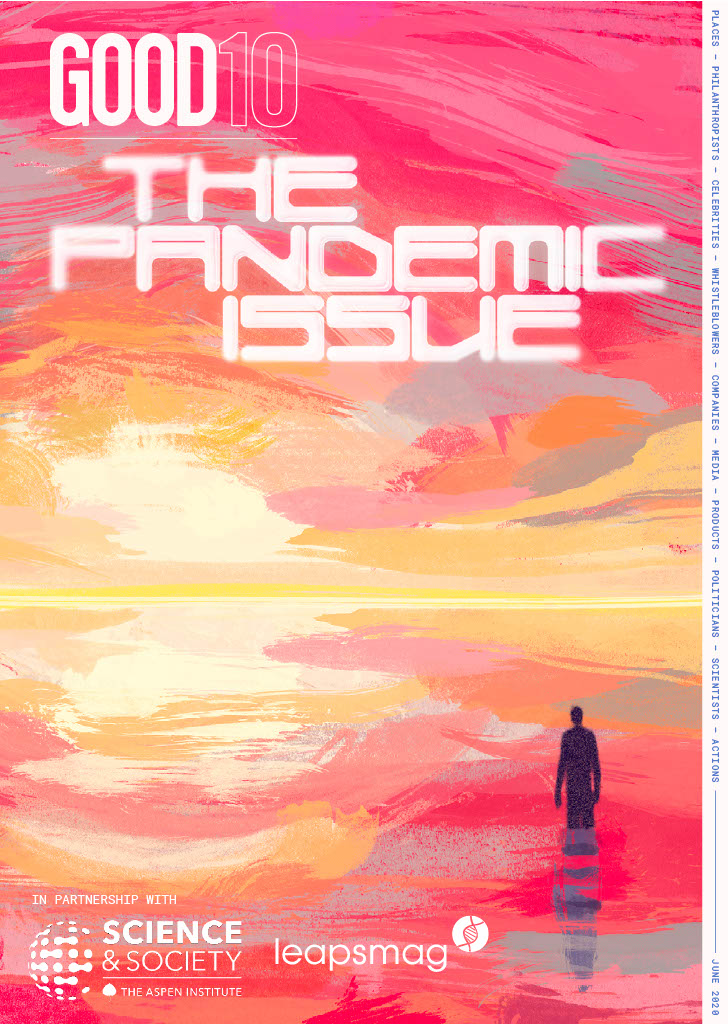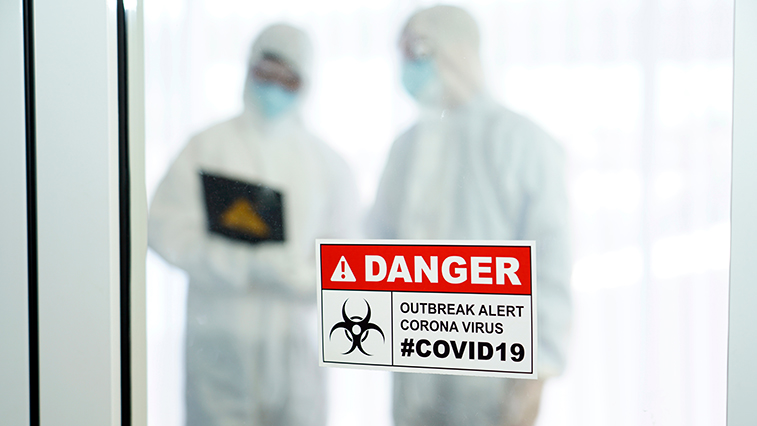When the first pandemic in a century swept across the globe, public health professionals understood that an array of action steps would be necessary to combat it. Over time, their response evolved to incorporate or consider lockdowns; control measures, such as masks and social distancing; equitable access to vaccines; risk assessments; and strategies for learning to live with the virus. Health, Medicine & Society has been engaged at every step, bringing experts together to consider best practices, develop effective messages, and plan for future infectious diseases.
Media
Aspen Ideas Health: Healthy Communication: How Truth Can Overpower Disinformation
Aspen Ideas Health 2024
June 22, 2024
From the measles vaccine to the origins of COVID, the speed at which disinformation spreads and the harms it can do have become painfully familiar. Communicators are fighting back, leveraging the same digital tools as myth purveyors—podcasts, TikTok, X, and other social media channels—to share scientific information in new ways, engage diverse audiences, combat falsehoods, and promote trustworthy medical and public health advice. Taking advantage of the democratization of health information, trusted messengers are empowering people to act in their real interests so they can stay healthy.
Aspen Ideas Health: After Long COVID: A Musical Performance of Self-Discovery
Aspen Ideas Health 2024
June 22, 2024
World-renowned cellist Joshua Roman blends performance and storytelling to share his experience with long COVID and the life-altering limitations that nearly ended his career. After a crisis of struggle and self-doubt, Roman emerged with a profound acceptance of who he is, and a deeper understanding of what it takes to deal with a mysterious medical challenge. An intimate musical journey, his Immunity project shares the story of illness and renewal through his own musical compositions and those of others. Doctors then talk about what they understand and what they still need to know about long COVID.
Aspen Ideas Health: Ready Next Time? Preparing for Another Pandemic
Aspen Ideas Health 2023
June 22, 2023
This session explores the idea that another pandemic is inevitable—and that we are still not prepared. Whether it is a COVID mutation, a bird flu, or something entirely unforeseen, the extent of the dangers we will face depends on public health, clinical capacity, the lethality of a new virus, and the ease of its transmission. Early warning systems and an equitable supply chain can reduce the risks, but the politicalization of science will likely make it harder to shut down the economy or influence individual behavior in the future. How do we overhaul current systems and keep people safe?
Aspen Ideas Health: Ensuring COVID Vaccinations for All
Aspen Ideas Health 2022
June 27, 2022
The stark differences between the availability of COVID-19 vaccines in high-income and low-income countries underscores the imperative of new approaches to global health equity. Investing in local manufacturing and scientific capacity, bolstering the public health infrastructure, prioritizing community engagement, and developing alternatives to the costly mRNA vaccine are key. Maria Elena Bottazzi, associate dean of the National School of Tropical Medicine at Baylor College of Medicine, Peter Hotez, dean of Baylor’s National School of Tropical Medicine, and Priti Krishtel, cofounder and executive director at I-MAK, discuss opportunities to ensure equitable access to COVID-19 vaccines. Helen Branswell, senior writer for STAT, moderates the conversation.
Aspen Ideas Health: After COVID: Preventing the Next Pandemic
Aspen Ideas Health 2022
June 27, 2022
For decades, public health experts warned of a coming pandemic and developed recommendations to prepare for it—yet when it arrived, the response was a catastrophic failure. Now that the world has watched a theoretical risk become real, can we learn our lessons and do better before the next threat inevitably arrives? Neil Vora, policy fellow at Conservation International, Anne Pritchett, senior vice president of policy and research at PhRMA, and Victor Dzau, president of the National Academy of Medicine explore that question. John Torres, senior medical correspondent at NBC News, moderates the discussion.
Aspen Ideas Health: Novavax Presents: The Last Mile: Coming Together to Make Vaccines Make a Difference
Aspen Ideas Health 2022
June 24, 2022
Despite the swift development of vaccines to combat COVID-19, large swaths of the global population are unvaccinated and the prospect of viral variants remains a deadly threat. Lori Rose Benson, executive director and CEO of Hip Hop Public Health, Darrell Gray, chief health equity officer at Anthem, and Lauren Smith, chief health equity and strategy officer at the CDC Foundation, talk about the need to empower community-led collaborations and trusted messengers, strengthen local infrastructure, conduct targeted research, and enact appropriate policy changes to ensure equitable access to vaccines and curb the worldwide spread of infectious diseases. John Trizzino, executive vice president at Novavax, moderates the conversation.
Aspen Ideas Health: Explainer: David Putrino on Long-COVID
Aspen Ideas Health 2022
June 23, 2022
Weeks and months after an initial COVID infection, as many as 20 percent of infected individuals are reporting new, lingering, or returning symptoms. Who is vulnerable, how bad does it get, how long does it last? David Putrino, director of rehabilitation innovation at Mount Sinai Health System, answers those questions.
Webinar: COVID-19: Where Are We Now? A conversation with Josh Sharfstein, MD
Health, Medicine & Society
August 25, 2021
On the Aspen Institute’s “Common Hour,” Joshua Sharfstein, vice dean for public health practice and community engagement at Johns Hopkins University Bloomberg School of Public Health, shares the latest pandemic developments. In conversation with HMS executive director Ruth Katz he answers questions such as: What do the current numbers tell us? Where do things stand on the potential availability of a vaccine? Is it safe to travel over the holidays?
Public Health Grand Rounds: Suicide Prevention During COVID and Beyond
Public Health Grand Rounds
February 24, 2021
Debra Houry, director of CDC’s National Center for Injury Prevention and Control, and Christine Moutier, chief medical officer at the American Foundation for Suicide Prevention, explore the effect of the COVID-19 pandemic on the mental health of the US population, describe critical steps for mitigating suicide risk, and present newly released data from the CDC on suicide. Rebecca Ruiz, senior features writer with Mashable, serves as moderator.
Webinar: Fireside Chat with the CDC’s Dr. Nancy Messonnier
Science & Society
December 7, 2020
Nancy Messonnier, director of the CDC’s National Center for Immunization and Respiratory Diseases when this webinar was held, talks about the scientific integrity of the CDC, concerns about the speed and safety of coronavirus vaccines, and the government’s effort to distribute them quickly and equitably. Nsikan Akpan, science editor of National Geographic, moderates the conversation, which is followed by a public Q&A.
Video: Blue Mind: The Healing Power of Water
Health, Medicine & Society
July 16, 2020
The stresses of the COVID-19 pandemic, coupled with other fundamental societal disruptions, highlights the importance of developing tools to help manage our emotional health. In a discussion hosted by HMS and the Aspen Institute’s High Seas Initiative, panelists talk about how one of our planet’s unique, most precious, and nearly ubiquitous resources—water—can make us happier, healthier, and better equipped to take on today’s challenges.
Video: The Pandemic Science Summit
Science & Society
June 23, 2020
As we emerge from the pandemic, the essential role of science innovation and communication to ensure a stable society has never been clearer. The Pandemic Science Summit, structured as a series of rotating conversations that bring together two science and medicine experts at a time, offers complementary and synergistic discussions.
Public Health Grand Rounds: Coronavirus: The New Pandemic
Public Health Grand Rounds
February 11, 2020
In a remarkably prescient Public Health Grand Rounds, Anthony Fauci, director of the National Institute of Allergy and Infectious Disease, Ron Klain, former White House Ebola response coordinator, and Nancy Messonnier, then director of the CDC’s National Center for Immunization and Respiratory Diseases, discuss the potential of a little-known coronavirus to become a pandemic. The webinar was held a month before the national lockdown, when SARS-CoV-2 had killed just 400 people. The questions they confront: How bad will it get, how dangerous is it, and are we prepared? Moderated by Helen Branswell, Infectious Disease and Public Health Reporter, STAT News.
Publications

Report: Powering Vaccine R&D: Opportunities for Transformation
Sabin-Aspen Vaccine Science & Policy Group
May 2021
SARS-CoV-2 and other emerging diseases, including Ebola and Zika, as well as perennial challenges, such as influenza, malaria, tuberculosis, HIV, and pertussis, all highlight the imperative of improving the research and development component of the vaccine/vaccination ecosystem. To move forward, this report calls for clear leadership roles and accountability, a transdisciplinary research effort, reimagined clinical trials, restructured regulatory science, and the aligning of incentives to position vaccines as a public good.

Report: Meeting the Challenge of Vaccination Hesitancy
Sabin-Aspen Vaccine Science & Policy Group
June 2020
COVID-19 and the resurgence of measles have highlighted the dangers of vaccine hesitancy, which the World Health Organization has called one of the top 10 threats to global health. Bold, interdisciplinary global action to foster vaccine acceptance should include a media collaborative to promote effective use of social media platforms, a research agenda to examine vaccine hesitancy and opportunities to counter it, and a new narrative that focuses on the achievements and promise of vaccines.

Magazine: The Pandemic Issue
Science & Society
June 2020
The Pandemic Issue, copublished by Science & Society and the science outlet Leaps.org, dives into basic science opportunities to address the overlapping dilemmas of pandemics and a warming planet and usher in a more equitable, more progress-oriented, and safer world. The magazine explores fundamental issues facing humanity through the lenses of ten forces pushing the needle toward progress: places, philanthropists, celebrities, whistleblowers, companies, media, products, politicians, scientists, and actions. Across these categories, the magazine presents unexpected and encouraging paradigms emerging from this historic crisis.

Article: Health Care Priorities for a COVID-19 Stimulus Bill: Recommendations to the Administration, Congress, and Other Federal, State and Local Leaders from Public Health, Medical, Policy and Legal Experts
Health, Medicine & Society
March 2020
In a piece designated as one of Health Affairs Top 10 most-read blog posts for 2020, HMS executive director Ruth Katz was among the authors of a framework for legislative action intended to guide Congress as it considers how best to protect the health of all Americans in the face of the pandemic.



